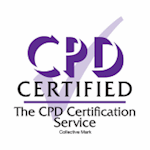Care Certificate Standard 6 - Communication
CPDUK Accredited | Instant Course Access | Includes Assessment & Certificate | Instant Certificate Download
LearnPac Systems
Summary
- Certificate of completion - Free
- Exam(s) / assessment(s) is included in price
- Tutor is available to students
Add to basket or enquire
Overview
Care Certificate Standard 6 - Communication | Online Training Course | CPDUK Accredited.
Welcome to our Care Certificate Standard 6 – Communication online course. All our online training courses, programmes and qualifications are accredited by the CPD Certification Service (CPDUK).
Communication is an essential part of a caring relationship as it encourages trusting relationships with co-workers, as well as the individuals you care for and their families.
This course demonstrates how communication helps build working relationships where each person’s views are valued and taken into account. It also acknowledges the part played by other workers in providing the best care and support possible.
Certificate duration: N/A
Entry requirements: No entry restrictions
Recommended prerequisites: N/A
Assessment type: End of course assessment
Assessment pass mark – 80% needed to pass and gain a CPD certificate
Cost(s) of assessment and certification – All costs included in the course price
Awarding/Accrediting body – CPD Certification Service (CPDUK)
Care Certificate Standard 6 - Communication | Online Training Course | CPDUK Accredited.
Certificates
Certificate of completion
Digital certificate - Included
CPD
Course media
Description
Course aims
The aims of this Care Certificate Standard 6 – Communication online course are to:
- Develop an awareness of the importance of effective communication skills at the workplace.
- Appreciate the various types of communication suitable for people with special needs.
- Appreciate the role of nonverbal cues in communication.
Learning objectives
On completion of this Care Certificate Standard 6 – Communication online course, the learner will be able to:
- Describe the different ways people communicate, how it affects relationships at work and why we should observe and be receptive to an individual’s reactions.
- Outline how to establish an individual’s communication and language needs, wishes and preferences.
- List a range of communication methods and styles that could help meet an individual’s communication needs and preferences.
- Suggest how to reduce barriers to communication and where to find support to help with effective communication.
Learning outcomes
On completion of this Care Certificate Standard 6 – Communication online course, the learner will be able to:
- Describe how communication affects relationships at work.
- State why it is essential to observe and be receptive to an individual’s reactions.
- List a range of communication methods and styles that could help meet an individual’s communication needs, wishes and preferences.
- Describe ways to reduce barriers to effective communication.
- Identify the principles and practices relating to confidentiality.
- Describe who to ask for advice and support about confidentiality.
- Suggest when to report any concerns about the need for communication aids.
Why is this course essential?
Excellent communication develops your knowledge and understanding about individuals and the part played by other workers to ensure providing the best care and support possible. It helps build working relationships where each person’s views are valued and taken into account.
What is covered in this course?
This Care Certificate Standard 6 – Communication online course is divided into the following sections:
- Unit 1 – Introduction
- Unit 2 – Types of communication
- Unit 3 – Choosing appropriate methods of communication
- Unit 4 – Successful communication
- Unit 5 – Communication needs and preferences
- Unit 6 – Key legislation and guidance
- End of course assessment.
Who is this course for?
The Care Certificate Standard 6 – Communication was developed for new healthcare and social care staff as part of their workplace induction.
The primary audience of the Care Certificate is healthcare support workers or adult social care workers. It is also suitable for existing health and social care staff who do not hold recognised qualifications.
Clinical support roles
The Care Certificate Standard 6 is suitable for those giving support to clinical roles in the NHS and other healthcare settings where there is any direct contact with patients, including:
- Health care assistants
- Care support workers
- Assistant practitioners.
Adult social care workers
The Care Certificate Standard 6 is also suitable for those giving support in community settings, including:
- Adult social care workers in residential, nursing homes and hospices
- Care home workers
- Domiciliary care staff.
Non-clinical roles
The Care Certificate Standard 6 is also suitable for other social care roles include:
- Caring volunteers
- Porters
- Cooks
- Drivers with direct contact with patients/ service users.
Requirements
Learn anywhere, anytime on any device.
You will need access to a desktop computer, laptop, tablet or smartphone device to complete these online courses. You can start, pause/stop and return to where you left off.
Our courses utilise responsive design features, making them available on any device of your choice.
Care Certificate Standard 6 - Communication | Online Training Course | CPDUK Accredited.
Career path
Our online courses and programmes range from introductory modules at Level 1 (awareness/beginner) to advanced and expert modules up to Level 6.
Our e-learning modules count towards CPD hours for professionals in various sectors as well as meeting mandatory and statutory requirements (where relevant).
Care Certificate Standard 6 - Communication | Online Training Course | CPDUK Accredited.
Questions and answers
Currently there are no Q&As for this course. Be the first to ask a question.
Reviews
Currently there are no reviews for this course. Be the first to leave a review.
Legal information
This course is advertised on reed.co.uk by the Course Provider, whose terms and conditions apply. Purchases are made directly from the Course Provider, and as such, content and materials are supplied by the Course Provider directly. Reed is acting as agent and not reseller in relation to this course. Reed's only responsibility is to facilitate your payment for the course. It is your responsibility to review and agree to the Course Provider's terms and conditions and satisfy yourself as to the suitability of the course you intend to purchase. Reed will not have any responsibility for the content of the course and/or associated materials.





